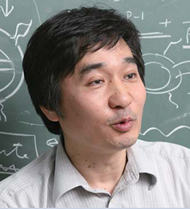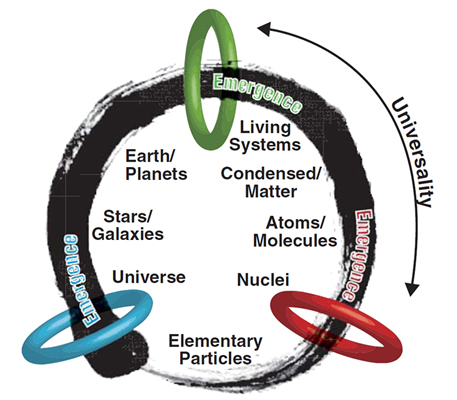Global Center of Excellence (GCOE) Programs
Interplay of Universality and Emergence

Program Leader:
Prof. Hikaru KAWAI
Nature consists of myriad scales of structure, from the tiny scales of elementary particles to the vast scale of the universe. Our attempt to elucidate the great variety of phenomena exhibited over this complete range of scales is a pursuit of diversity, while our attempt to construct general laws that can describe such diversity and, indeed, our quest to discover the fundamental law governing nature on all scales is a pursuit of universality. Of course, these pursuits are interdependent, with advances in one leading naturally to advances in the other. In this way, mankind obtains an ever-deeper understanding of nature.
Together with diversity and universality, another key concept in science is that of emergence. Emergence can be understood as the appearance of phenomena whose existence could not have been predicted only on the basis of knowledge of the laws governing smaller scales. Clearly, our recognition of the great variety of phenomena in nature led to the concept of emergence, but this concept goes beyond the mere recognition of nature’s variety and can be regarded as a principle according to which we can account for this variety. In order to grasp the significance of emergence and its role in science, it should first be noted that any phenomena, no matter how complex, must be generated by interactions on smaller scales, and hence, in principle, it should be possible to describe them in terms of more fundamental laws. However, it is essential to realize that nature displays almost limitless varieties of phenomena whose existence could not be predicted even if the fundamental laws governing the more microscopic scales of a system are known. In the study of science, it is often the case that after such a phenomenon has been discovered, it is eventually explained in terms of more fundamental laws, but historically, it is quite rare that truly novel phenomena are predicted purely through deduction from fundamental laws. With this realization, we are led to a scientific viewpoint according to which the infinite variety of phenomena is understood as “emerging” in nature.
From this viewpoint, it is easy to understand why the interplay of universality and emergence is so important in physics. As an illustration of this point, suppose that some emergent phenomenon on a particular scale happens to be discovered. Then, through the elucidation of the mechanism responsible for this phenomenon, it may be possible to recognize how similar phenomena could occur in other systems and on different scales. This process of discovery, elucidation and induction may thus lead to the prediction of other emergent phenomena. If such novel emergent phenomena are indeed found to exist, then the mechanism responsible for their emergence will be recognized as a universal law. Next, because the same procedure should also be applicable to phenomena on more microscopic scales, the pursuit of emergence can, in turn, lead to the discovery of more fundamental laws of physics.
The Global COE program at Kyoto University employs a scientific approach based on the understanding that physics consists, in essence, of the interplay between universality and emergence. Using this approach, our goal is to construct the next generation of physics. In order to achieve our objective, it is essential that we do not view physics as merely a set of sub-fields to be studied independently. Rather, we must take a broad view of physics as a unified field, employing a wider perspective of natural science. For this reason, our program is managed by members whose fields cover all areas in the Division of Physics and Astronomy at Kyoto University. The aim of our program is to advance this view so that it can serve as a stronger base for the study of science – playing a vital role in the development of the next generation of physics – and serve as an international center for fostering talented young researchers capable of opening up new scientific frontiers.


